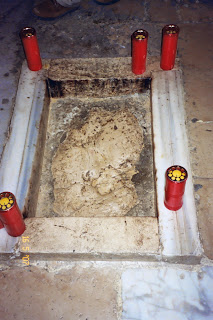Solemnity of the Ascension of the Lord
[In the name of the Father, and of the Son, and of the Holy Spirit. Amen]. When it comes to difficult times for most people, any time a person has to wait probably ranks towards the top. Maybe it’s a child waiting for summer break to begin in the last days of May and the first days of June (or maybe a teacher!). Maybe it’s a mother, waiting for her child to be born. Maybe it’s waiting in a doctor’s office or in the lobby of a dealership to get the oil changed. Maybe it’s waiting on the phone for a customer service representative to try to resolve whatever issue you may be having. For me, one of the frustrating things is that there is nothing I can do to speed up the time when I’m waiting. I have no control.
So, in this time, we also wait, as we have from the year AD 33. And our waiting is really twofold: waiting to celebrate the promised gift of the Holy Spirit at Pentecost, and waiting for the Parousia, the return of Christ in glory.
While we wait to celebrate the coming of the Holy Spirit at Pentecost, we should be asking the Holy Spirit to dwell within us more deeply, especially through the Novena to the Holy Spirit. These days between the Ascension and Pentecost was the first novena, the first nine-days of prayer for a particular petition. Granted, in most dioceses that’s now shortened to seven days, but that’s another story. Still, even though we have received the Holy Spirit, especially through the holy sacraments of Baptism and Confirmation, we can never have too much of the Third Divine Person of the Blessed Trinity, the one who is our Advocate, who strengthens us with gifts like wisdom and courage, and who gives us the fruits of love, joy, and peace, among others. While waiting at a doctor’s office or waiting on the phone can seem very passive, where you can’t do anything else, waiting for the Holy Spirit is more like waiting for summer break, or even giving birth to a child, where there are preparations and things to be done so that, when the day comes, we’re ready. It would be very sad to go into labor, knowing that we hadn’t started or completed the baby’s room or crib, or bought the necessary supplies to help the child thrive and grow outside the womb. But, when it comes to Pentecost, how often does this happen, that we are not quite ready to receive the Holy Spirit?
But beyond Pentecost, we wait for Christ to return in glory. And this, too, is not a passive waiting. This wait should be active. Because at the end of time, Christ will put all things “beneath his feet,” as St. Paul says in his epistle to the Ephesians. What is not of Christ will be cast down; what is of Christ will be raised up. In this waiting time, we have the opportunity to participate in that reign of Christ already, even though it’s not yet fully known. We have the opportunity to cast down all that is not of God, and focus on making sure we devote all of our words, actions, and thoughts to God so that God will raise us up, and will not have to cast us down, whether in totality to Hell, or even just parts of us in Purgatory, the parts that have to be burned up like chaff, or like the dross that is burned off to purify gold.
We know that Christ will return, but we don’t know when that will happen. So, the best plan of action is to make ourselves ready at all times, or at least as ready as we can be. And it’s not just a matter of looking the part (I remember a sign that said, “God is coming back; look busy.”). Making ourselves ready is only possible by cooperating with God’s grace, and letting that grace transform us from the inside out. We are not promised more time. We are only promised today; God only gives us “now” to turn away from sin and turn back to Him. If we passively wait, presuming we have more time, the day of Christ’s return, or the day of our death, could catch us off guard, and then perhaps we will be cast down because we had not allowed Christ to configure us to Himself.
Waiting is difficult. And it’s especially difficult when we see evil grow and be celebrated and good struggle to survive and be persecuted. We might feel tempted at times just to give up, like our wait will never end. But, like summer break for children; like the day of birth for a pregnant woman; even like when we’re waiting in a doctor’s room: the time will come when our hope will be fulfilled and our joy, which no one will be able to take from us, will be complete in Christ [who with the Father and the Holy Spirit, lives and reigns for ever and ever. Amen]










